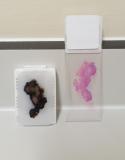Test Directory
EGFR mutation analysis (FFPE)
Containers - Adult

FFPE block / H&E slide / Pathology report
|
|
Laboratory Site
Old Dalkeith Road
Edinburgh
EH16 4SA
Transport arrangements
Referral specimens should be sent directly to Molecular Pathology at the above address (see transport recommendations). For patients with pathology specimens held within NHS Lothian there is no need to arrange transport of specimens.
How to request
EGFR mutation analysis can be requested individually or as part of the lung cancer panel. EGFR mutation analysis may, in some circumstances, also be performed on cell-free tumour DNA (cfDNA) isolated from blood.
Availability
Monday - Friday. 09:00 – 17:00
Anticipated turnaround
An integrated Molecular Pathology report should be available within 10 working days. See results.
Static information/disclaimer
NGS and analysis by COBAS EGFR test are both accredited to ISO 15189.
Please note, alternative methodologies may be used. Full details will be included in all reports.
General additional information
Epidermal growth factor receptor (EGFR) tyrosine kinase inhibitors (TKIs) are currently used as first line treatment for patients with advanced metastatic non-small cell lung cancer (NSCLC). Somatic mutations in exons 18 to 21 of the EGFR gene are used to predict response to EGFR TKIs.
Molecular Pathology use an NGS panel or the COBAS® EGFR mutation kit (Roche Diagnostics) for the detection of EGFR variants. Further details of the NGS panel and regions analysed can be found here. The COBAS EGFR mutation kit can detect 41 mutations in exons 18-21 of the EGFR gene: 30 deletions and complex mutations in exon 19; c.2369C>T p.(Thr790Met); c.2303G>T p.(Ser768Ile); c.2573T>G or c.2573_2574delTGinsGT p.(Leu858Arg); c.2155G>A p.(Gly719Ser); c.2156G>C p.(Gly719Ala); c.2155G>T p.(Gly719Cys); and 4 insertions in exon 20. The assay detects 86.7% of known mutations in exons 18 to 21 as listed in the Catalogue of Somatic Mutations in Cancer.
EGFR mutation analysis is carried out as part of the lung cancer testing panel, which also includes KRAS mutation analysis, PD-L1 expression and detection of ALK and ROS1 gene rearrangements.
For clinical advice on appropriate investigations, please contact our Molecular Pathology team.